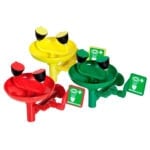Product information
Of sweet and salty soaps
Our customers consciously choose stainless steel as a material. Because stainless steel combines elegance with a high level of durability and stability. And now the supposedly 'rust-free' stainless steel product shows discolouration or rust spots after only a short time? The assumption is obvious that it must be a material or processing defect.
Why does my "rust-free" stainless steel product rust?
Of course, there can be errors on the part of the manufacturer, but that is rare. Much more often, however, the cause is a very simple one: soap. Stainless steel has a passive layer that permanently protects the surface from corrosion. If this passive layer is destroyed, however, stainless steel is also vulnerable.
Contact with salts such as bromides, iodides and chlorides or ammonium increases the corrosive effect even more.
Which soap can I use without hesitation?
Due to the large number of soaps on offer and the constant changes in formulations, we are unfortunately unable to give any specific recommendations for products. The soaps offered by us can be used without any restrictions. If you want to use a third party product, please check the ingredients carefully. Strong acids, bases, salts such as chlorides, bromides, iodides, etc. should not be included, as these can cause corrosion when they come into contact with stainless steel. If your soap dispenser is equipped with a filler cap, please be sure to use it. The evaporation of soap ingredients can produce aggressive gas mixtures that can also have a corrosive effect.
The right fastening
Contact with base metals can also damage the passive layer. Pay particular attention to high-quality fixing materials such as stainless steel screws and washers.






